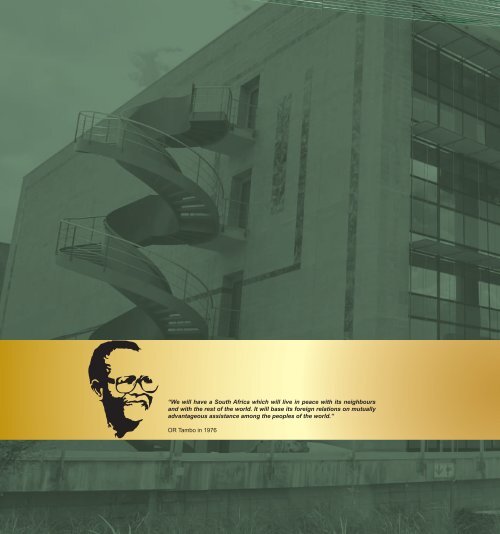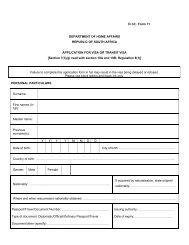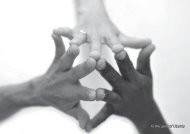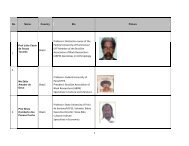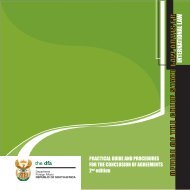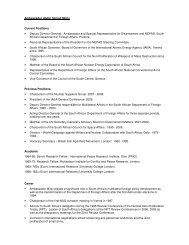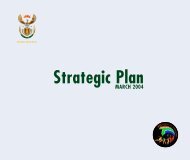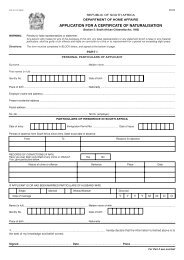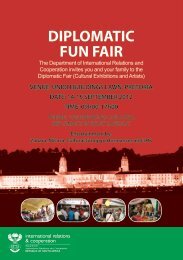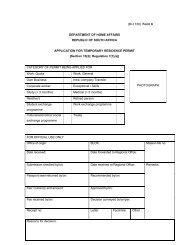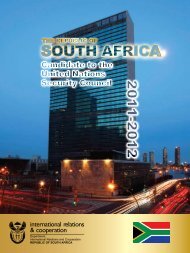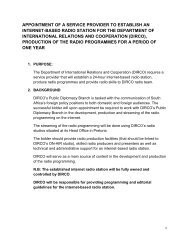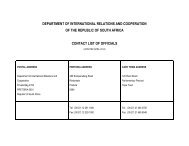Part I - Department of International Relations and Cooperation
Part I - Department of International Relations and Cooperation
Part I - Department of International Relations and Cooperation
You also want an ePaper? Increase the reach of your titles
YUMPU automatically turns print PDFs into web optimized ePapers that Google loves.
“We will have a South Africa which will live in peace with its neighbours<br />
<strong>and</strong> with the rest <strong>of</strong> the world. It will base its foreign relations on mutually<br />
advantageous assistance among the peoples <strong>of</strong> the world.”<br />
OR Tambo in 1976
The <strong>Department</strong> <strong>of</strong> <strong>International</strong> <strong>Relations</strong> <strong>and</strong><br />
<strong>Cooperation</strong> (DIRCO)<br />
or tamBo BuIlDInG<br />
460 Soutpansberg Road<br />
Reitondale<br />
Pretoria<br />
0084<br />
Tel: +27 12 351 1000<br />
www.dirco.gov.za
TABLE OF CONTENT<br />
<strong>Part</strong> 1: General InformatIon 2-11<br />
Submission <strong>of</strong> the annual report to the executive authority 2<br />
1.1 executive Summary by the Director-General 4-5<br />
<strong>Part</strong> 3: ProGramme PerformanCe 38-95<br />
Programme 1: administration 40-45<br />
Programme 2: foreign relations 45-64<br />
1.2 report <strong>of</strong> the minister <strong>of</strong> the <strong>Department</strong> <strong>of</strong> <strong>International</strong><br />
relations <strong>and</strong> <strong>Cooperation</strong> (DIrCo)<br />
1.3 the mission Statement 12<br />
1.4 legislative m<strong>and</strong>ate 12-13<br />
6-11<br />
<strong>Part</strong> 2: Human reSourCeS 14- 37<br />
1. Service Delivery 16<br />
2. expenditure 17<br />
3 employment <strong>and</strong> Vacancies 18<br />
4. Job evaluation 19<br />
5. employment changes 20-22<br />
6. employment equity 23-25<br />
7. Performance rewards 26-27<br />
8. foreign Workers 28<br />
9. leave utilisation for the period 1 January 2006 to 31<br />
December 2006<br />
29-30<br />
10. HIV anD aIDS <strong>and</strong> Health Promotion programmes 31<br />
11. labour relations 32-34<br />
12. Skills Development 35-36<br />
13. Injury on duty 37<br />
1. ConSolIDatIon <strong>of</strong> tHe afrICan aGenDa 45-48<br />
2. StrenGtHenInG SoutH-SoutH Co-oPeratIon 48-49<br />
3. StrenGtHenInG nortH-SoutH Co-oPeratIon 49-50<br />
4. <strong>Part</strong>ICIPate In tHe GloBal SYStem <strong>of</strong> GoVernanCe 50-56<br />
5. StrenGtHenInG PolItICal anD eConomIC relatIonS 57-64<br />
Programme 3: Protocol <strong>and</strong> Public Diplomacy 65-66<br />
State Protocol 65<br />
Public Diplomacy 66<br />
Performance Information 67-94<br />
Programme 4: <strong>International</strong> transfers 95<br />
<strong>Part</strong> 4: rePort <strong>of</strong> tHe auDIt CommIttee 96-97<br />
P <strong>Part</strong> 5: tHe annual fInanCIal StatementS<br />
(Separate table <strong>of</strong> contents)<br />
abbreviations <strong>of</strong> Government <strong>Department</strong> <strong>and</strong> acronyms<br />
Vote 3 - Annual Report 2009 - 10 <strong>Department</strong> <strong>of</strong> <strong>International</strong> <strong>Relations</strong> <strong>and</strong> <strong>Cooperation</strong><br />
1
Vote 3 - Annual Report 2009 - 10<br />
<strong>Part</strong> 1<br />
General Information<br />
Submission <strong>of</strong> the annual report to the executive authority<br />
<strong>Department</strong> <strong>of</strong> <strong>International</strong> <strong>Relations</strong> <strong>and</strong> <strong>Cooperation</strong> 2<br />
To the Minister <strong>of</strong> <strong>International</strong> <strong>Relations</strong> <strong>and</strong> <strong>Cooperation</strong>, Ms Maite Nkoana-Mashabane; I have<br />
the honour <strong>of</strong> presenting the 2009-10 Annual Report <strong>of</strong> the <strong>Department</strong> <strong>of</strong> <strong>International</strong> <strong>Relations</strong><br />
<strong>and</strong> <strong>Cooperation</strong>.<br />
___________________________________<br />
Dr ay<strong>and</strong>a ntsaluba<br />
Director-General:<br />
<strong>Department</strong> <strong>of</strong> <strong>International</strong> relations <strong>and</strong> <strong>Cooperation</strong>
Minister Maite Nkoana-Mashabane<br />
Vote 3 - Annual Report 2009 - 10 <strong>Department</strong> <strong>of</strong> <strong>International</strong> <strong>Relations</strong> <strong>and</strong> <strong>Cooperation</strong><br />
3
1.1 Executive Summary by<br />
the Director-General <strong>of</strong> the<br />
<strong>Department</strong> <strong>of</strong> <strong>International</strong><br />
<strong>Relations</strong> <strong>and</strong> <strong>Cooperation</strong><br />
(DIRCO)<br />
NEPAD remains the Social development blueprint for Africa <strong>and</strong> the framework for<br />
Africa’s engagement with the North <strong>and</strong> other international fora/actors. South Africa<br />
continues to support NEPAD in its work <strong>and</strong> participated in the AU Summit in August<br />
2009 <strong>and</strong> the Heads <strong>of</strong> State <strong>and</strong> Implementation Committee (HSGIC) Summit in<br />
February 2010. The 14th AU Summit adopted the establishment <strong>of</strong> the NEPAD<br />
Planning <strong>and</strong> Coordinating Agency (NPCA) as a technical body <strong>of</strong> the AU, to replace<br />
the NEPAD Secretariat. The Summit also adopted the recommendations on the<br />
integration <strong>of</strong> NEPAD into the structures <strong>and</strong> processes <strong>of</strong> the AU. SA continues to<br />
host <strong>and</strong> support both the NEPAD Agency as well as the Secretariat <strong>of</strong> the APRM.<br />
Vote 3 - Annual Report 2009 - 10<br />
<strong>Department</strong> <strong>of</strong> <strong>International</strong> <strong>Relations</strong> <strong>and</strong> <strong>Cooperation</strong> 4<br />
During March 2009, the <strong>Department</strong> <strong>of</strong> <strong>International</strong> <strong>Relations</strong> <strong>and</strong><br />
<strong>Cooperation</strong> tabled its three year Medium Term Strategic Plan for<br />
the period 01 April 2009 to 31 March 2012 to Parliament. The plan<br />
was informed by Government’s Medium Term Strategic Framework<br />
2009–2014 whose central objective was to set the country on a higher <strong>and</strong><br />
sustainable growth trajectory by the end <strong>of</strong> 2014. The 2009/12 strategic plan built<br />
on the foundations that had already been laid in previous years <strong>and</strong> affirmed the<br />
role <strong>and</strong> work <strong>of</strong> the <strong>Department</strong> as the custodian <strong>of</strong> <strong>International</strong> <strong>Relations</strong> policy<br />
implementation <strong>of</strong> the country.<br />
In the <strong>Department</strong>’s 2009/12 Strategic Plan seven key priority areas had been<br />
identified as follows:<br />
• Continued prioritisation <strong>of</strong> the African Continent<br />
• Strengthen South – South <strong>Relations</strong><br />
• Strengthen <strong>Relations</strong> with formations <strong>of</strong> the North<br />
• Strengthen Political <strong>and</strong> Economic <strong>Relations</strong><br />
• <strong>Part</strong>icipate in the Global System <strong>of</strong> Governance<br />
• Organisational Strengthening<br />
• The Provision <strong>of</strong> Operational Support Services<br />
The seven key priority areas aligned the work <strong>of</strong> the <strong>Department</strong> to contribute<br />
to Government’s domestic priorities.The continued prioritisation <strong>of</strong> the African<br />
Continent remained the principal focus <strong>of</strong> South Africa’s foreign policy during the<br />
year under review. In this regard, the <strong>Department</strong> continued its African Union (AU)<br />
processes to promote African Unity <strong>and</strong> integration.<br />
Furthermore, South Africa also contributed to the debates on the rationalisation <strong>and</strong><br />
harmonisation <strong>of</strong> the Regional Economic Communities (REC’s). These REC’s are<br />
deemed to be building blocks <strong>of</strong> economic <strong>and</strong> political integration that recognises<br />
the eventual establishment <strong>of</strong> the Union Government <strong>of</strong> Sovereign States as its key<br />
objective.<br />
During the year under review, South Africa was elected into the AU Peace <strong>and</strong><br />
Security Council for a two-year term, was also re-elected to the United Nations<br />
Human Rights Committee <strong>and</strong> received the endorsement <strong>of</strong> the African Union (AU)<br />
for South Africa’s c<strong>and</strong>idature for the non-permanent seat <strong>of</strong> the United Nations<br />
Security Council (UNSC) for the period 2011–2012.<br />
South Africa continued to provide the technical <strong>and</strong> logistical support to the Pan<br />
African Parliament, in accordance with the Host Country Agreement. South Africa<br />
also continued to promote <strong>and</strong> support the operationalisation <strong>of</strong> the AU Financial<br />
Institutions <strong>and</strong> in this regard, participated in the Extra–Ordinary Conference <strong>of</strong><br />
African Ministers <strong>of</strong> Economy <strong>and</strong> Finance (CAMEF) <strong>and</strong> played an instrumental<br />
role in the review <strong>of</strong> the African Investment Bank (AIF) statutes.<br />
South Africa has continued with <strong>and</strong> maintained its engagement in the AU-UN<br />
peace missions on the African Continent <strong>and</strong> intensified such peace efforts with the<br />
launching <strong>of</strong> the Southern African Development Community St<strong>and</strong>by Force. South<br />
Africa’s peacekeeping efforts include deployment in the DRC (MONUC) the Sudan<br />
(UNAMID) as well as mediation efforts in Madagascar <strong>and</strong> Zimbabwe.<br />
South Africa continued to strengthen bilateral relations with African countries through<br />
high-level engagements <strong>and</strong> visits <strong>and</strong> through engagement at various bilateral <strong>and</strong><br />
multilateral forums.<br />
Our priority <strong>of</strong> strengthening relations with countries <strong>and</strong> formations <strong>of</strong> the South<br />
continued. In this regard South Africa participated in the IBSA Ministerial Trilateral<br />
Commission during 31 August to 01 September 2009 at which Commission the<br />
Ministers agreed to enhance political coordination among IBSA countries, to<br />
formulate joint positions <strong>and</strong> to enhance IBSA’s role <strong>and</strong> visibility within the global<br />
system <strong>of</strong> governance.<br />
South Africa also participated, inter alia, in the NAASP Coordinating Unit on Capacity<br />
Building for Palestine in June 2009, the IOR-ARC 9th Council <strong>of</strong> Ministers meeting<br />
also in June 2009, the Ministerial meeting <strong>of</strong> the coordinating Bureau (COB) <strong>of</strong> the<br />
Non-Aligned Movement (NAM) during April 2009 <strong>and</strong> in meetings <strong>of</strong> the Group <strong>of</strong><br />
77 (G77) <strong>and</strong> China.<br />
South Africa continued to prioritise Africa on the agenda <strong>of</strong> EU, G8, Commonwealth<br />
<strong>and</strong> other organisations <strong>of</strong> the North. SA-EU bilaterals were considerably<br />
strengthened during 2009/10, with the primary focus being on fully implementing the<br />
SA–EU Trade, Development <strong>and</strong> <strong>Cooperation</strong> Agreement (TDCA) <strong>and</strong> implementing<br />
the SA-EU Strategic <strong>Part</strong>nership Joint Action Plan.<br />
South Africa continues to advance the importance <strong>of</strong> multilateralism in addressing<br />
global challenges. The <strong>Department</strong> facilitated, coordinated <strong>and</strong> supported a number<br />
<strong>of</strong> Presidential <strong>and</strong> Ministerial engagements relevant to our participation in the Global<br />
System <strong>of</strong> Governance. Such engagements included amongst others, the UNGA64,<br />
G5 Ministerial debate on General Assembly Revitalisation, the Thirty Sixth Session<br />
<strong>of</strong> the Food <strong>and</strong> Agricultural Organisation’s Conference <strong>and</strong> COP15. Subsequent<br />
to the AU endorsement <strong>of</strong> South Africa as the c<strong>and</strong>idate for the non-permanent<br />
seat <strong>of</strong> the United Nations Security Council during 2011-2012, South Africa has<br />
implemented measures to ensure effective participation in this body.<br />
The 2009/10 financial year saw the inauguration <strong>of</strong> the new President <strong>and</strong> a number<br />
<strong>of</strong> outgoing State Visits as well as foreign Heads <strong>of</strong> State <strong>and</strong> Government visiting<br />
South Africa on <strong>of</strong>ficial state matters. The <strong>Department</strong> played a key role in the<br />
Presidential Inauguration <strong>and</strong> continued to provide the necessary Protocol services<br />
to the President, Deputy President <strong>and</strong> Ministers.
Director-General Dr Ay<strong>and</strong>a Ntsaluba<br />
One <strong>of</strong> the key objectives <strong>of</strong> the <strong>Department</strong>’s Strategy for 2009/10 was to engage continued to take steps to improve its financial management processes, procedures<br />
in programmes that will take the work <strong>of</strong> the department to the people <strong>of</strong> South <strong>and</strong> systems <strong>and</strong> also its compliance with Government’s Financial Management<br />
Africa. Consequently, a number <strong>of</strong> outreach programmes hosted by the Minister <strong>of</strong> Regulatory Framework. Once again the department received an unqualified audit<br />
<strong>International</strong> <strong>Relations</strong> <strong>and</strong> <strong>Cooperation</strong> were undertaken as part <strong>of</strong> the department’s report without any other matters being reported. The financial improvement plans<br />
Public Diplomacy m<strong>and</strong>ate.<br />
implemented by the <strong>Department</strong> have thus achieved the desired results. I wish to<br />
thank the Corporate Services <strong>and</strong> Internal Audit teams for their efforts in ensuring<br />
The <strong>Department</strong> continued the roll–out <strong>of</strong> its 3 year Human Resources Strategy that the department adheres to the Financial Management Regulatory Framework,<br />
to ensure that the <strong>Department</strong> builds the necessary capacity to deliver on its as well as Governance prescripts. I also place on record my pr<strong>of</strong>ound gratitude to the<br />
m<strong>and</strong>ate. Furthermore the <strong>Department</strong>, through the Diplomatic Training, Research Audit Committee for their stewardship, support <strong>and</strong> the firm yet always pr<strong>of</strong>essional<br />
<strong>and</strong> Development Unit addressed the skills developmental needs <strong>of</strong> DIRCO <strong>and</strong> manner in carrying out their oversight functions <strong>and</strong> also for continuing to be a<br />
also carried out policy research on priority issues for South Africa’s foreign policy. source <strong>of</strong> inspiration to both myself <strong>and</strong> the Management <strong>of</strong> the <strong>Department</strong>.<br />
Significant amongst these is the draft paper on Economic Diplomacy which will be<br />
given further attention during the 2010/11 financial year.<br />
I am indeed grateful to Minister Maite Nkoana-Mashabane, Deputy Minister Ebrahim<br />
Ebrahim <strong>and</strong> Deputy Minister Sue van der Merwe for their wisdom <strong>and</strong> continuous<br />
During September 2009 the <strong>Department</strong> relocated to its new Head Quarters, tireless support <strong>and</strong> guidance in the execution <strong>of</strong> the <strong>Department</strong>’s m<strong>and</strong>ate<br />
OR Tambo Building in Soutpansberg Road, Rietondale, Pretoria. The building during this period. The <strong>Department</strong> also recognises the exceptional support <strong>of</strong> the<br />
was inaugurated by the President on 11 December 2009. The implementation <strong>of</strong> <strong>International</strong> Cluster (ICTS), The Portfolio Committee on <strong>International</strong> <strong>Relations</strong> <strong>and</strong><br />
a world–wide Voice over Internet Protocol ICT infrastructure has continued <strong>and</strong> <strong>Cooperation</strong> <strong>and</strong> the Select Committee on Economic <strong>and</strong> Foreign Affairs as well as<br />
is reaching its final stages. The implementation <strong>of</strong> the VOIP infrastructure has the Staff at Head Office <strong>and</strong> our Missions abroad. I thank you for your contribution<br />
considerably improved the efficiency <strong>of</strong> departmental operations. The <strong>Department</strong> to the success <strong>of</strong> the <strong>Department</strong>.<br />
Vote 3 - Annual Report 2009 - 10 <strong>Department</strong> <strong>of</strong> <strong>International</strong> <strong>Relations</strong> <strong>and</strong> <strong>Cooperation</strong><br />
5
1.2 Report <strong>of</strong> the Minister <strong>of</strong> the<br />
<strong>Department</strong> <strong>of</strong> <strong>International</strong><br />
<strong>Relations</strong> <strong>and</strong> <strong>Cooperation</strong><br />
(DIRCO)<br />
During 2009/10, we marked 15 years <strong>of</strong> a democratic South Africa; the<br />
20th anniversary <strong>of</strong> Ntate Rolihlahla Nelson M<strong>and</strong>ela’s release from<br />
prison; the 50th Commemoration <strong>of</strong> the Sharpeville massacre as<br />
well as the golden jubilees (50th anniversary) <strong>of</strong> at least 17 African<br />
States including the DRC, Cameroon, Togo, Madagascar, Democratic Republic <strong>of</strong><br />
Congo, Somalia, Benin, Niger, Burkina Faso, Côte d’Ivoire, Chad, Central African<br />
Republic, Gabon, Senegal, Mali, Nigeria <strong>and</strong> Mauritania. This was also a year that<br />
we celebrated the 110th year <strong>of</strong> the birth <strong>of</strong> the Pan-African Movement.<br />
Vote 3 - Annual Report 2009 - 10<br />
<strong>Department</strong> <strong>of</strong> <strong>International</strong> <strong>Relations</strong> <strong>and</strong> <strong>Cooperation</strong> 6<br />
Despite the numerous challenges <strong>of</strong> governance, underdevelopment, poverty,<br />
disease, conflicts, <strong>and</strong> experienced exploitation, Africans continued to display<br />
remarkable resilience, determination <strong>and</strong> will to retain their dignity. It was heartening<br />
to note that the advent <strong>of</strong> peace, security, stability <strong>and</strong> the spread <strong>of</strong> democracy <strong>and</strong><br />
sustainable development in Africa were finally taking root.<br />
Our foreign policy programmes <strong>and</strong> activities continued to rest on a number<br />
<strong>of</strong> key focal areas, five (5) <strong>of</strong> which are the prioritization <strong>of</strong> the African Agenda;<br />
the strengthening <strong>of</strong> South-South relations; the strengthening <strong>of</strong> relations with<br />
formations <strong>of</strong> the North; participating in the Global System <strong>of</strong> Governance; <strong>and</strong> the<br />
strengthening <strong>of</strong> our Bilateral Economic <strong>and</strong> Political relations.<br />
tHe afrICan aGenDa<br />
As our country progresses into the future, our engagements on the African<br />
continent, i.e. our African Agenda, continue to be guided by our resolve to seek <strong>and</strong><br />
promote development; contribute to the resolution <strong>of</strong> conflicts; <strong>and</strong> the building <strong>of</strong> an<br />
environment in which socio-economic development can take place.<br />
reGIonal InteGratIon<br />
Our approach to regional integration continued to be informed by the fact that South<br />
Africa’s destiny remains inextricably linked to the SADC region <strong>and</strong> the entire African<br />
continent. We remain committed to supporting regional <strong>and</strong> continental integration<br />
programmes. Our foreign policy framework in relation to our engagements at the<br />
continental <strong>and</strong> regional levels still remain premised on the twin pillars <strong>of</strong> promoting<br />
peace, security <strong>and</strong> stability; whilst advancing a regional developmental agenda.<br />
President Jacob Zuma <strong>and</strong> Minister Maite Nkoana-Mashabane at the SADC Summit<br />
We have also reiterated our unshaken commitment <strong>and</strong> resolve towards our<br />
Continent’s integration programme. In view <strong>of</strong> our belief that Regional Economic<br />
Communities (RECs) are the building blocks <strong>of</strong> an envisaged strong <strong>and</strong> focused<br />
African Union – we supported the view that our SADC be strengthened <strong>and</strong> focused.<br />
In our own context, SADC remains our primary vehicle for the realization <strong>of</strong> our<br />
programme <strong>of</strong> regional integration <strong>and</strong> development.<br />
Our strategy in SADC continued to rest on three pillars, i.e. restoring, strengthening<br />
<strong>and</strong> maintaining political unity <strong>and</strong> cohesion within deepening regional economic<br />
integration; <strong>and</strong> intensifying regional infrastructural development.<br />
Our position still remains that socio-economic development cannot take place in<br />
the absence <strong>of</strong> peace <strong>and</strong> stability, let alone, it being critical for addressing the<br />
root causes <strong>of</strong> conflict <strong>and</strong> instability. We held <strong>and</strong> continue to hold the belief that<br />
the political <strong>and</strong> economic integration <strong>of</strong> Africa has been <strong>and</strong> will continue to drive<br />
the African Agenda. As we sought to defend the geo-strategic interests <strong>of</strong> the<br />
Continent, we believe that SADC has to remain the primary vehicle for the eventual<br />
achievement <strong>of</strong> regional integration <strong>and</strong> development.<br />
Having been instrumental in the development <strong>of</strong> the African Peer Review Mechanism<br />
(APRM), we remained convinced that it is a unique system <strong>of</strong> self review by African<br />
peers. We remain supportive <strong>of</strong> the APRM, as we believe it holds the potential to<br />
enhance the popularization <strong>of</strong> these progressive values in our continent.<br />
South Africa continued to carry out its SADC m<strong>and</strong>ate <strong>of</strong> facilitating negotiations<br />
between Zimbabwe’s ZANU-PF <strong>and</strong> the two MDC formations with a view to finding<br />
a solution to outst<strong>and</strong>ing issues in the implementation <strong>of</strong> the Global Political<br />
Agreement. We noted progress in the constitution making process, the conclusion<br />
<strong>of</strong> which we remain convinced will open the way for a national plebiscite, thus paving<br />
the way for holding <strong>of</strong> free <strong>and</strong> fair elections.<br />
South Africa remained committed to promoting the New Economic <strong>Part</strong>nership for<br />
Africa’s Development (NEPAD) since its adoption as a socio-economic development<br />
programme <strong>of</strong> the AU. South Africa has over the last decade, contributed to two<br />
tangible elements <strong>of</strong> the African Renaissance, namely the transformation <strong>of</strong> the<br />
continent’s political architecture, the OAU to the AU <strong>and</strong> the integration <strong>of</strong> NEPAD.
SoutH-SoutH relatIonS<br />
In our commitment to strengthen South-South <strong>Cooperation</strong>, we continued working<br />
with countries <strong>of</strong> the South in finding political, economic <strong>and</strong> social convergence in<br />
our fight against poverty <strong>and</strong> underdevelopment. The motivation to strengthen <strong>and</strong><br />
broaden our South-South <strong>Cooperation</strong> is informed by our shared history <strong>and</strong> current<br />
challenges as well as a need to diversify our trade partners.<br />
As we seek to contribute to the strengthening <strong>of</strong> South-South <strong>Cooperation</strong>, South<br />
Africa will continue to participate in forums such as the NAM, G77 + China, the<br />
India-Brazil-South Africa Dialogue Forum (IBSA); the New Asia-Africa Strategic<br />
<strong>Part</strong>nership (NAASP); <strong>and</strong> in Africa’s multilateral partnerships with countries <strong>of</strong> the<br />
South.<br />
Our engagements with countries <strong>of</strong> the South continued to be governed <strong>and</strong> informed<br />
by the key principles <strong>of</strong> partnership, solidarity, equality, mutual respect <strong>and</strong> mutual<br />
benefit. Our view remained that South-South <strong>Cooperation</strong> provided the necessary<br />
space to confront our common challenges; <strong>and</strong> is a complement to, rather than a<br />
substitute for our engagements with the North.<br />
In the aftermath <strong>of</strong> the global financial <strong>and</strong> economic crises, we noted that as<br />
countries <strong>of</strong> the South, we needed, amongst others, to support one another by<br />
broadening the scope <strong>of</strong> our economic engagement <strong>and</strong> by enhancing technical,<br />
financial, <strong>and</strong> institutional partnerships.<br />
Above: President Jacob Zuma <strong>and</strong> Minister Maite Nkoana-Mashabane at the AU Summit<br />
Above left: President Jacob Zuma with Brazilian President Lula da Silva <strong>and</strong> Indian Prime Minister<br />
Manmohan Singh during the IBSA Summit, Brasilia<br />
Left: President Jacob Zuma with (from left) Swedish Prime Minister Fredrik Reinfeldt, Secretary-<br />
General Javier Solana <strong>and</strong> EU Commissioner Karel De Gucht during the SA-EU Strategic<br />
<strong>Part</strong>nership<br />
StrenGtHenInG relatIonS WItH<br />
formatIonS <strong>of</strong> tHe nortH<br />
In our interactions with developed countries <strong>of</strong> the North, we sought to identify, build<br />
<strong>and</strong> reinforce mutually beneficial relations. Such mutuality helped us to push back<br />
the frontiers <strong>of</strong> poverty, as we launched <strong>and</strong> took forward our struggles against<br />
poverty, lack <strong>of</strong> sufficient health resources, insufficient job opportunities, challenges<br />
<strong>of</strong> crime <strong>and</strong> agrarian reform <strong>and</strong> the skilling <strong>and</strong> training <strong>of</strong> our young in all fields<br />
<strong>of</strong> education.<br />
We continued to embrace a developmental <strong>and</strong> investment-oriented approach to<br />
our engagements with the European Union, G8, G20 <strong>and</strong> other OECD countries.<br />
In all our interactions, we pursued a more inclusive process that is based on the<br />
principles <strong>of</strong> partnership, equality <strong>and</strong> mutual respect.<br />
Through our membership <strong>of</strong> the Africa Caribbean Pacific (ACP) Group, we continued<br />
to engage the European Union in support <strong>of</strong> the global development agenda, <strong>and</strong><br />
specifically their support for Africa’s developmental priorities. With our national<br />
priorities continuing to inform the basis <strong>of</strong> our engagements with countries <strong>of</strong> the<br />
North, we have ensured that we implement the provisions <strong>of</strong> the South Africa-EU<br />
Strategic <strong>Part</strong>nership.<br />
To this end we have already signed the first Revision Agreement to the Trade <strong>and</strong><br />
Vote 3 - Annual Report 2009 - 10 <strong>Department</strong> <strong>of</strong> <strong>International</strong> <strong>Relations</strong> <strong>and</strong> <strong>Cooperation</strong><br />
7
Vote 3 - Annual Report 2009 - 10<br />
<strong>Department</strong> <strong>of</strong> <strong>International</strong> <strong>Relations</strong> <strong>and</strong> <strong>Cooperation</strong> 8<br />
Above: Minister Maite Nkoana-Mashabane addressing the United Nations Conference on the<br />
World Financial <strong>and</strong> Economic Crisis <strong>and</strong> its Impact on Development.<br />
Above right: Deputy Minister Ebrahim Ebrahim participating in the UN Security Council<br />
Bottom right: Deputy Minister Sue van der Merwe participating in the discussion on the role <strong>of</strong> the<br />
UN Security Council in supporting security sector reform<br />
Development <strong>Cooperation</strong> Agreement (TDCA) in 2009, which together with the Joint<br />
Action Plan for the SA-EU Strategic <strong>Part</strong>nership, laid the ground for an enhanced<br />
<strong>and</strong> deepened relationship in existing diverse <strong>and</strong> new areas <strong>of</strong> cooperation.<br />
<strong>Part</strong>ICIPatIon In tHe GloBal<br />
SYStem <strong>of</strong> GoVernanCe<br />
Our continued participation in the Global System <strong>of</strong> Governance remained in<br />
pursuance <strong>of</strong> global political <strong>and</strong> socio-economic stability <strong>and</strong> security within<br />
the multilateral system. In every conceivable forum, we also sought to enhance<br />
developmental objectives <strong>of</strong> the developing world, including the attainment <strong>of</strong><br />
equitable global order.<br />
enVIronment<br />
In view <strong>of</strong> our commitment to addressing the issue <strong>of</strong> climate change, South Africa<br />
participated in the 15th Conference <strong>of</strong> <strong>Part</strong>ies (COP15) held in Copenhagen within<br />
the UN Framework Convention on Climate Change (UNFCCC). We believed then,<br />
as we do now, that we have to give effect to the principle <strong>of</strong> common but differentiated<br />
responsibilities enshrined in the UNFCCC.<br />
South Africa, together with like-minded countries <strong>of</strong> the South, including Brazil,<br />
Indian <strong>and</strong> China (BASIC) emerged from COP15 in Copenhagen a more coherent<br />
grouping - in response to developed countries targeting “major developing<br />
countries,” to shoulder more <strong>of</strong> the burden for climate change support <strong>and</strong> mitigation<br />
than provided for by the UNFCCC.<br />
As per the decisions <strong>of</strong> COP15, the negotiations process stemming from the Bali<br />
Action Plan will carry on to COP16 in Cancun, Mexico at the end <strong>of</strong> 2010. South<br />
Africa will take over the baton from Mexico when we host COP17 in 2011.<br />
GenDer<br />
South Africa will continue to play an active role in advancing the UN Secretary-<br />
General’s proposals on strengthening the UN Gender machinery. The idea is that<br />
gender issues will be mainstreamed into peace-making, peace-keeping <strong>and</strong> peacebuilding<br />
operations <strong>of</strong> the UN. We also expect gender issues to be mainstreamed<br />
into all activities <strong>of</strong> the AU.<br />
There is no disputing the fact that the plight <strong>of</strong> women <strong>and</strong> the girl child in Africa<br />
(<strong>and</strong> elsewhere in the world) needs our urgent <strong>and</strong> undivided attention. Women <strong>of</strong><br />
Africa, regardless <strong>of</strong> which country they originate from, seek economic, political <strong>and</strong><br />
social emancipation. We remain convinced that no country is free until its women<br />
are free.<br />
tHe rSa at tHe unIteD natIon’S<br />
SeCurItY CounCIl (unSC)<br />
It is common knowledge that South Africa’s c<strong>and</strong>idature for a non-permanent seat at<br />
the UN Security Council was endorsed by the SADC region <strong>and</strong> the African Union<br />
for 2011-2012. Following our occupancy <strong>of</strong> the non-permanent seat <strong>of</strong> the Security<br />
Council in 2007 <strong>and</strong> 2008 – <strong>and</strong> the experience gained – South Africa is confident<br />
that it will be able to champion the cause <strong>of</strong> Africa at the UNSC <strong>and</strong> contribute<br />
positively to the core m<strong>and</strong>ate <strong>of</strong> the UNSC - which is the maintenance <strong>of</strong> global<br />
peace <strong>and</strong> security.
Minister Maite Nkoana-Mashabane with her American counterpart Secretary <strong>of</strong><br />
State Hillary Clinton at the launch <strong>of</strong> the South Africa - United States <strong>of</strong> America<br />
Strategic Dialogue<br />
President Jacob Zuma <strong>and</strong> Minister Maite Nkoana-Mashabane holding bilaterals with<br />
President Hugo Chavez at the side lines <strong>of</strong> the Africa-South America Summit, Venezuela<br />
StrenGtHenInG <strong>of</strong> BIlateral eConomIC<br />
anD PolItICal relatIonS<br />
In the context <strong>of</strong> strengthening our bilateral economic <strong>and</strong> political relations, the<br />
<strong>Department</strong> <strong>of</strong> <strong>International</strong> <strong>Relations</strong> <strong>and</strong> <strong>Cooperation</strong> continued to be guided by<br />
the need to be relevant to the five key priorities <strong>of</strong> government. Our <strong>Department</strong> has,<br />
at all times, committed itself to pursuing engagements <strong>and</strong> interactions that promise<br />
to breathe life to our priorities <strong>of</strong> education, health, job creation, crime prevention,<br />
<strong>and</strong> agrarian reform.<br />
We continued to find more creative ways <strong>of</strong> strengthening our capacity to tap into<br />
economic diplomacy opportunities here at home <strong>and</strong> abroad through our Missions,<br />
including improving the marketing <strong>of</strong> our country <strong>and</strong> Africa. Having noted the<br />
importance <strong>of</strong> communicating with both our internal <strong>and</strong> external audiences, we<br />
have prioritized communication <strong>of</strong> our foreign policy positions <strong>and</strong> preoccupations<br />
using our public diplomacy tools.<br />
Deputy President, Kgalema Motlanthe addressing media at the close <strong>of</strong> the London Summit at the<br />
ExCel Arena in London, UK<br />
In this regard, we continued to place high priority on our strategic partnership with<br />
the People’s Republic <strong>of</strong> China, the Republic <strong>of</strong> Korea, India, Russia <strong>and</strong> Japan.<br />
sOur relations with countries from the Gulf continued to be important <strong>and</strong> strategic.<br />
Notwithst<strong>and</strong>ing, the Gulf is also a source <strong>of</strong> investment <strong>and</strong> home to a sizeable<br />
community <strong>of</strong> South African expatriates, but our companies continue to be involved<br />
in major projects in the areas <strong>of</strong> defense, construction <strong>and</strong> petrochemicals.<br />
Traditionally, we have had very beneficial relations with the Americas, at the centre<br />
<strong>of</strong> which we placed our focused <strong>and</strong> strategic platforms for cooperation.<br />
We were pleased to note that countries <strong>of</strong> North America, i.e. Canada <strong>and</strong> the<br />
USA, continued to be major contributors to Foreign Direct Investment <strong>and</strong> Official<br />
Development Assistance in South Africa. Despite FDIs <strong>and</strong> ODA as the defining<br />
feature <strong>of</strong> our relations, we acknowledged that there is still potential for growth in our<br />
bilateral relations, especially as this relates to trade, investment <strong>and</strong> tourism.<br />
Vote 3 - Annual Report 2009 - 10 <strong>Department</strong> <strong>of</strong> <strong>International</strong> <strong>Relations</strong> <strong>and</strong> <strong>Cooperation</strong><br />
9
Vote 3 - Annual Report 2009 - 10<br />
<strong>Department</strong> <strong>of</strong> <strong>International</strong> <strong>Relations</strong> <strong>and</strong> <strong>Cooperation</strong> 10<br />
DIrCo anD tHe PrIVate SeCtor<br />
Our <strong>Department</strong> remained supportive <strong>of</strong> South African private sector expansion on<br />
the continent as there were <strong>and</strong> still are clear win-win opportunities. In this respect,<br />
we also remained <strong>of</strong> the view that a voluntary code <strong>of</strong> Good Business practice<br />
be developed in conjunction with a wide range <strong>of</strong> role-players (including academic<br />
institutions, BUSA, national departments). Such a Code, we maintain, will represent<br />
a commitment to promote peace <strong>and</strong> stability, democracy, sound economic<br />
management, accountability <strong>and</strong> people-centred development.<br />
DIrCo anD tHe fIfa WorlD CuP<br />
Our <strong>Department</strong> committed itself to making sure that the 2010 FIFA World Cup<br />
soccer extravaganza became one <strong>of</strong> the most memorable, successful <strong>and</strong> historic<br />
event ever to be staged on African soil. In our participation during the preparatory<br />
stages, we moved from the premise that a successful World Cup would create a<br />
new momentum for the regeneration <strong>of</strong> Africa as envisioned by our forefathers,<br />
something that will help contribute immensely to a change in perception <strong>and</strong> a shift<br />
in paradigm <strong>of</strong> Africa.<br />
As we moved from one country to the other popularizing the event, we believed that<br />
it will be advisable for all <strong>of</strong> Africa to use the event to reverse the negative trend<br />
that has characterised the contemporary narrative on Africa <strong>and</strong> its prospects for<br />
prosperity <strong>and</strong> development. Our vision beyond the World Cup was that we will<br />
have to find ways <strong>of</strong> utilizing the momentum generated by the collective impact <strong>and</strong><br />
positive mood <strong>of</strong> the World Cup to promote peace, tolerance <strong>and</strong> social cohesion.<br />
PuBlIC DIPlomaCY<br />
In the area <strong>of</strong> public diplomacy, we have in the past year committed DIRCO to<br />
undertaking annual journeys to all the provinces across South Africa, in an effort to<br />
roll-out our <strong>Department</strong>’s public participation programme. Our public participation<br />
programme sought to create the necessary space <strong>and</strong> time to engage other nonstate<br />
actors like our academia, NGOs, business <strong>and</strong> broader society on matters that<br />
relate to the country’s foreign policy <strong>and</strong> our department.<br />
It remains our intention to use these interactions to familiarize the public on our<br />
foreign policy preoccupations <strong>and</strong> our m<strong>and</strong>ate; ensure that our ordinary folk can link<br />
our country’s domestic priorities <strong>and</strong> our <strong>Department</strong>’s international engagements,<br />
amongst others.<br />
In conclusion <strong>and</strong> with the positive mood generated by the recent success <strong>of</strong> the<br />
FIFA World Cup, we are more determined to seize this opportunity in consolidating<br />
the African Agenda so that we can contribute towards the new-found Afro-Optimism<br />
– from which our Continent can regenerate economically, politically, socially <strong>and</strong><br />
technologically. We owe it to our future generations to seize the moment.<br />
Thank you,<br />
Je vous remerci<br />
Mucho gracias<br />
Ke a leboga<br />
Deputy President Kgalema<br />
Motlanthe launching the new<br />
VW South Africa’s <strong>Part</strong>s <strong>and</strong><br />
Distribution Centre in Centurion,<br />
Tshwane
Minister Maite Nkoana-Mashabane being interviewed by the media, OR Tambo Building<br />
Vote 3 - Annual Report 2009 - 10 <strong>Department</strong> <strong>of</strong> <strong>International</strong> <strong>Relations</strong> <strong>and</strong> <strong>Cooperation</strong><br />
11<br />
Minister Maite Nkoana-Mashabane visiting the Mashishing Old Age Home in Lydenburg, Mpumalanga
international relations<br />
& cooperation<br />
<strong>Department</strong>:<br />
<strong>International</strong> <strong>Relations</strong> <strong>and</strong> <strong>Cooperation</strong><br />
rePuBlIC <strong>of</strong> SoutH afrICa<br />
Vote 3 - Annual Report 2009 - 10<br />
<strong>Department</strong> <strong>of</strong> <strong>International</strong> <strong>Relations</strong> <strong>and</strong> <strong>Cooperation</strong> 12<br />
1.3 Mission Statement<br />
Vision<br />
Our vision is an African continent, which is prosperous, peaceful, democratic, non-racial,<br />
non-sexist <strong>and</strong> united <strong>and</strong> which contributes to a world that is just an equitable<br />
mission<br />
We are committed to promoting South Africa’s national interests <strong>and</strong> values, the African<br />
Renaissance <strong>and</strong> the creation <strong>of</strong> a better world for all.<br />
Strategic objectives<br />
• Through bilateral <strong>and</strong> multilateral interactions protect <strong>and</strong> promote South<br />
African national interests <strong>and</strong> values<br />
• Conduct <strong>and</strong> co-ordinate South Africa’s international relations <strong>and</strong><br />
promote its foreign policy objectives<br />
• Monitor international developments <strong>and</strong> advise government on foreign<br />
policy <strong>and</strong> related domestic matters<br />
• Protect South Africa’s sovereignty <strong>and</strong> territorial integrity<br />
• Contribute to the formulation <strong>of</strong> international law <strong>and</strong> enhance respect for<br />
the provisions there<strong>of</strong><br />
• Promote multilateralism to secure a rules based international system<br />
• Maintain a modern, effective <strong>and</strong> excellence driven <strong>Department</strong><br />
• Provide consular services to South African nationals abroad<br />
• Provide a world class <strong>and</strong> uniquely South African State Protocol service<br />
Values<br />
The <strong>Department</strong> <strong>of</strong> <strong>International</strong> <strong>Relations</strong> <strong>and</strong> <strong>Cooperation</strong> adheres to<br />
the following values:<br />
• Patriotism<br />
• Loyalty<br />
• Dedication<br />
• Ubuntu<br />
• Equity<br />
• Integrity<br />
• Batho pele<br />
1.4 Legislative M<strong>and</strong>ate <strong>of</strong><br />
the <strong>Department</strong><br />
According to the South African Constitution the President is ultimately responsible<br />
for the foreign policy <strong>and</strong> international relations <strong>of</strong> South Africa. It is the<br />
prerogative <strong>of</strong> the President to appoint Heads <strong>of</strong> Mission, to receive foreign<br />
Heads <strong>of</strong> Mission, to conduct State to State relations <strong>and</strong> to negotiate <strong>and</strong> sign all<br />
international agreements. <strong>International</strong> agreements which are not <strong>of</strong> a technical,<br />
administrative or executive nature will only bind the Republic after being approved<br />
by Parliament. Parliament also approves ratification or accession <strong>of</strong> the Republic to<br />
multilateral agreements. All international agreements must be tabled in Parliament<br />
for information purposes.<br />
The Minister <strong>of</strong> <strong>International</strong> <strong>Relations</strong> <strong>and</strong> <strong>Cooperation</strong>, in accordance with her Cabinet<br />
portfolio responsibilities, is entrusted with the formulation, promotion <strong>and</strong> execution <strong>of</strong><br />
South Africa’s foreign policy <strong>and</strong> with the daily conduct <strong>of</strong> South Africa’s international<br />
relations.<br />
The Minister assumes overall responsibility for all aspects <strong>of</strong> South Africa’s<br />
international relations in consultation with the President. In practice, the Minister<br />
consults the Cabinet <strong>and</strong> individual Cabinet Ministers on aspects <strong>of</strong> importance,<br />
as well as on aspects that overlap with the priorities <strong>and</strong> programmes <strong>of</strong> other<br />
Ministries <strong>and</strong> <strong>Department</strong>s.<br />
In view <strong>of</strong> the Minister’s overall responsibility, Minister advises the Presidency <strong>and</strong><br />
Ministers on those international matters in which they should be involved, provides<br />
them with strategic information on developments in the international arena, facilitates<br />
their participation at international events, <strong>and</strong> advises them on policy options that<br />
they may pursue in the national interests. Other Cabinet Ministers are required to<br />
consult the Minister <strong>of</strong> <strong>International</strong> <strong>Relations</strong> <strong>and</strong> <strong>Cooperation</strong> on their international<br />
role. From this practice at Cabinet level, which is a Presidential instruction, it follows<br />
that there must be a similar interaction between <strong>Department</strong>s.<br />
To facilitate interaction <strong>and</strong> collaboration, government has implemented the system<br />
<strong>of</strong> Clusters at both Ministerial <strong>and</strong> <strong>Department</strong>al levels. Important issues <strong>of</strong> foreign<br />
policy <strong>and</strong> international relations, the development <strong>of</strong> sector priorities <strong>and</strong> the<br />
implementation <strong>of</strong> international relations programmes are the core focus <strong>of</strong> the<br />
clusters. In terms on this m<strong>and</strong>ate, the <strong>Department</strong> participates in all five clusters<br />
<strong>and</strong> Co-chairs the <strong>International</strong> <strong>Cooperation</strong>, Trade <strong>and</strong> Security Cluster (ICTS).
The Parliamentary Portfolio Committee on <strong>International</strong> <strong>Relations</strong> <strong>and</strong> <strong>Cooperation</strong><br />
is an important mechanism to ensure oversight <strong>and</strong> accountability in the formulation<br />
<strong>and</strong> conduct <strong>of</strong> South Africa’s foreign policy <strong>and</strong> relations.<br />
The <strong>Department</strong>’s overall m<strong>and</strong>ate is to work for the realisation <strong>of</strong> South Africa’s<br />
foreign policy objectives. More specifically, the <strong>Department</strong>’s primary m<strong>and</strong>ate is to<br />
assist the Minister in carrying out her cabinet <strong>and</strong> Ministerial responsibilities.<br />
The <strong>Department</strong> conducts its m<strong>and</strong>ate by: monitoring developments in the<br />
international environment; communicating government’s policy positions;<br />
developing <strong>and</strong> advising government on policy options, mechanisms <strong>and</strong> avenues<br />
for achieving objectives; protecting our sovereignty <strong>and</strong> territorial integrity, assisting<br />
South African citizens abroad; <strong>and</strong> by assisting partner <strong>Department</strong>s in navigating<br />
complex international dynamics.<br />
South Africa’s diplomatic <strong>and</strong> consular missions help to enhance our international<br />
pr<strong>of</strong>ile, <strong>and</strong> serve as strategic mechanisms for the achievement <strong>of</strong> our national<br />
interests <strong>and</strong> for carrying out our m<strong>and</strong>ate. South Africa maintains diplomatic<br />
relations with countries <strong>and</strong> organisations through 124 missions in 107 countries<br />
abroad, <strong>and</strong> through the accreditation <strong>of</strong> more than 160 countries <strong>and</strong> organisations<br />
resident in South Africa.<br />
Defining South Africa’s <strong>International</strong><br />
relations (foreign) Policy<br />
Foreign policy is a multidimensional set <strong>of</strong> policies, principles, strategies, objectives,<br />
<strong>and</strong> plans that cannot easily be packaged into a neatly described formula. However, it<br />
is necessary to consider in broad but clear terms the general orientation <strong>of</strong> our foreign<br />
policy - which serve to define our national values <strong>and</strong> benchmark our foreign policy<br />
decision-making <strong>and</strong> strategies.<br />
Our Presidents <strong>and</strong> <strong>International</strong> <strong>Relations</strong> Ministers have enunciated the principles<br />
underlying South Africa’s foreign policy since 1994 in various forums. These include<br />
State <strong>of</strong> the Nation addresses, budget vote speeches, addresses to international<br />
<strong>and</strong> regional bodies such as the United Nations, the African Union <strong>and</strong> the Non-<br />
Aligned Movement, as well as in various foreign policy discussion documents such<br />
as those for Heads <strong>of</strong> Mission Conferences <strong>and</strong> Strategic Planning initiatives.<br />
Despite some significant changes <strong>and</strong> developments in the global environment,<br />
these principles have remained consistent <strong>and</strong> enduring, <strong>and</strong> have taken on even<br />
greater significance given current international developments.<br />
the following list <strong>of</strong> South africa’s foreign<br />
policy principles is a distillation from the<br />
speeches, statements <strong>and</strong> documents<br />
on South africa’s foreign policy.<br />
Principles underpinning South Africa’s <strong>International</strong> <strong>Relations</strong> Policy<br />
The principles which serve as guidelines in the conduct <strong>of</strong> our <strong>International</strong> <strong>Relations</strong><br />
include:<br />
• A commitment to the promotion <strong>of</strong> human rights<br />
• A commitment to the promotion <strong>of</strong> democracy<br />
• A commitment to justice <strong>and</strong> international law in the conduct <strong>of</strong> relations<br />
between nations<br />
• A commitment to international peace <strong>and</strong> to internationally agreed upon<br />
mechanisms for the resolution <strong>of</strong> conflicts<br />
• A commitment to Africa in world affairs, <strong>and</strong><br />
• A commitment to economic development through regional <strong>and</strong><br />
international co-operation in an interdependent (<strong>and</strong> globalised) world<br />
In addition to these principles the following<br />
tenets have been enunciated as guidelines to<br />
instruct our approach to foreign policy:<br />
• Foreign policy is an integrated part <strong>of</strong> government policy, aimed at<br />
promoting security <strong>and</strong> the quality <strong>of</strong> life, <strong>of</strong> all South Africans<br />
• A commitment that South Africa, as a member <strong>of</strong> the United Nations <strong>and</strong><br />
as a responsible citizen <strong>of</strong> the world, will live up to its obligations in this<br />
regard <strong>and</strong> contribute to a peaceful world<br />
• Commitment to the African Renaissance through the African Union <strong>and</strong><br />
its programme for Africa’s development, namely the New <strong>Part</strong>nership for<br />
Africa’s Development.<br />
• Commitment to economic development through regional integration<br />
<strong>and</strong> development in the Southern African Development Community <strong>and</strong><br />
the Southern African Customs Union.<br />
• Interact with African partners as equals<br />
• Pursue friendly relations with all peoples <strong>and</strong> nations <strong>of</strong> the world<br />
• Peace making <strong>and</strong> conflict prevention should receive priority<br />
consideration. Preventive diplomacy <strong>and</strong> proactive initiatives should<br />
be the approach, <strong>and</strong> monitoring mechanisms with African partners is<br />
essential<br />
• Actively engage in efforts to secure international peace <strong>and</strong> security,<br />
promote disarmament, prevent genocide, restrict the proliferation <strong>of</strong><br />
arms <strong>and</strong> secure a new world security compact through the United<br />
Nations (as the primary global security body), the Non-Aligned<br />
Movement, the African Union, the Southern African Development<br />
Community, the Commonwealth <strong>and</strong> other multilateral fora.<br />
• Promote multilateralism to secure a rules-based international system<br />
• Promote the democratisation <strong>and</strong> reform <strong>of</strong> the United Nations system<br />
<strong>and</strong> the Bretton Woods Institutions (i.e. <strong>International</strong> Monetary Fund <strong>and</strong><br />
World Bank).<br />
• Promote a rules-based international trading regime through the World<br />
Trade Organisation.<br />
• Combat racism, sexism, xenophobia <strong>and</strong> other related intolerances.<br />
• Promote the Agenda <strong>of</strong> the South through South-South Co-operation <strong>and</strong><br />
North-South <strong>Part</strong>nerships.<br />
• Eradication <strong>of</strong> poverty through the attainment <strong>of</strong> the Millennium<br />
Development Goals by 2015, <strong>and</strong> through the implementation<br />
<strong>of</strong> the manifestos such as the WTO Doha Development Agenda, the<br />
Monterrey Finance for Development, World Conference Against Racism<br />
<strong>and</strong> the World Summit on Sustainable Development.<br />
• Promote sustainable <strong>and</strong> people-centred development<br />
• Support efforts to alleviate the plight <strong>of</strong> refugees <strong>and</strong> children in Africa,<br />
<strong>and</strong> elsewhere, <strong>and</strong> particularly support the work <strong>of</strong> the UNHCR<br />
• Promote a positive image <strong>of</strong> South Africa.<br />
• Safeguard South Africa’s territorial integrity <strong>and</strong> sovereignty.<br />
Vote 3 - Annual Report 2009 - 10 <strong>Department</strong> <strong>of</strong> <strong>International</strong> <strong>Relations</strong> <strong>and</strong> <strong>Cooperation</strong><br />
13
<strong>Part</strong> 2<br />
Human Resources<br />
The Human Resources Strategy has been central in guiding <strong>and</strong> shaping our efforts<br />
as we deepen <strong>and</strong> entrench people management processes. We remain committed to<br />
ensuring that the department has people who make a difference for South Africa through<br />
effective, efficient <strong>and</strong> pr<strong>of</strong>essional human resources services. The commitment has<br />
been demonstrated in a number <strong>of</strong> areas including the ones below.<br />
effective organisational arrangements<br />
The foundation for provision <strong>of</strong> pr<strong>of</strong>essional human resources services has been laid <strong>and</strong><br />
is underpinned, amongst others, by an appropriate Organisational Structure, Policies,<br />
Systems <strong>and</strong> Procedures for Managing Performance, Labour <strong>Relations</strong>, Organisational<br />
Development, Transformation <strong>and</strong> Employee Wellness.<br />
Vote 3 - Annual Report 2009 - 10<br />
<strong>Department</strong> <strong>of</strong> <strong>International</strong> <strong>Relations</strong> <strong>and</strong> <strong>Cooperation</strong> 14<br />
The year under review has been characterised by a number <strong>of</strong><br />
interventions <strong>and</strong> developments including the following:<br />
A number <strong>of</strong> policies have been subjected to a review process including, Recruitment<br />
<strong>and</strong> Selection, Placement, HIV/AIDS <strong>and</strong> will be finalised in the next financial year.<br />
The reviewed Performance Management Policy has been implemented, however,<br />
there is still room for improvement especially in ensuring that we use Performance<br />
Management as a management tool to address day to day management issues.<br />
The <strong>Department</strong> continued with education <strong>and</strong> training programmes on Labour<br />
<strong>Relations</strong> processes especially for those preparing for posting abroad. The collective<br />
bargaining <strong>and</strong> consultative structures were engaged <strong>and</strong> solutions were found to<br />
human resources issues arising from the move to the OR Tambo Building, such as,<br />
finding alternate positions for employees affected by the move.<br />
Advocacy work aimed at enhancing the awareness <strong>of</strong> employees about key labour<br />
relations processes <strong>and</strong> training <strong>of</strong> managers in disciplinary processes has been<br />
undertaken. The review <strong>of</strong> the Labour <strong>Relations</strong> Framework started in earnest <strong>and</strong> will<br />
be concluded during the next financial year.<br />
The Employee Wellness Centre (EWC) continues to implement health promotion<br />
programmes <strong>and</strong> render psycho-social support to all DIRCO employees <strong>and</strong> their<br />
family members. During the year under review, the EWC intensified its efforts to<br />
support transferred employees <strong>and</strong> their families. To this end, DIRCO developed<br />
<strong>and</strong> commenced with enhanced implementation <strong>of</strong> strategies aimed at supporting<br />
employees <strong>and</strong> families in Hardship Missions.<br />
The Culture <strong>and</strong> Climate Survey outcomes were translated into five key projects to be<br />
implemented in the context <strong>of</strong> a shared vision <strong>of</strong> the desired culture.<br />
Employee Wellbeing Center HIV/Aids Day aids testing done at Head Office<br />
Career, Succession <strong>and</strong> talent management<br />
Through its concerted employee br<strong>and</strong>ing activities, the <strong>Department</strong> was rated as the<br />
second best employer <strong>of</strong> choice by tertiary students studying towards qualifications in<br />
Humanities. This graduate survey conducted by Magnet Communications annually,<br />
involves over 100 private organisations from a variety <strong>of</strong> industries <strong>and</strong> focuses on<br />
students from across the 23 Universities in South Africa. The <strong>Department</strong> was also<br />
rated the second best employer amongst Public Sector employers in the same survey.<br />
For the first time, the <strong>Department</strong> hosted a Career Exhibition Day at Head Office on 18<br />
March 2010. A varied audience was invited to engage with <strong>of</strong>ficials on the work <strong>of</strong> the<br />
<strong>Department</strong> as well as available career opportunities. There was also a strong focus<br />
on career management in the <strong>Department</strong>, involving interventions such as individual<br />
career counseling, group career counseling <strong>and</strong> a career website. These initiatives<br />
were undertaken with the aim <strong>of</strong> assisting employees take advantage <strong>of</strong> available<br />
career opportunities within the <strong>Department</strong> <strong>and</strong> to manage their careers in a proactive<br />
manner.<br />
Diplomatic training, research & Development (DtrD)<br />
The <strong>Department</strong>, through the Branch: Diplomatic Training, Research & Development,<br />
addresses the skills developmental needs <strong>of</strong> the DIRCO <strong>and</strong> carries out policy research<br />
on priority issues for South Africa’s foreign policy. The Diplomatic Academy as an<br />
accredited training institution with the Public Services Sector Education <strong>and</strong> Training<br />
Authority (PSETA) <strong>of</strong>fers training in preparation for Foreign Service to departmental<br />
<strong>of</strong>ficials. Diplomatic training was <strong>of</strong>fered to 19 Heads <strong>of</strong> Mission, 26 senior level<br />
Counsellors, 55 mid-level Diplomatic Trainees.<br />
recruitment, Selection <strong>and</strong> Placement<br />
During the year under review the <strong>Department</strong> filled 319 posts, 134 <strong>of</strong> which represented<br />
the promotion <strong>of</strong> internal c<strong>and</strong>idates whilst 185 were external c<strong>and</strong>idates. Over <strong>and</strong><br />
above this, the cadet programme which serves as the talent pipeline for postings abroad<br />
was voted as the best internship programme in government.<br />
Protocol training was extended to a total <strong>of</strong> 1738 <strong>of</strong>ficials from all levels <strong>of</strong> the public sector<br />
as well as from semi-state <strong>and</strong> private enterprises such as Telkom, the Justice College<br />
<strong>and</strong> the organisers <strong>of</strong> the 2010 FIFA World Cup. In addition to diplomatic training the<br />
following training was delivered: Mission Administration, Foreign Languages, Computer<br />
training, English Language training, various courses for Management Development <strong>and</strong><br />
generic training in line with the Workplace Skills Plan (WSP).
Above <strong>and</strong> below: Future diplomats receiving training in the Conference<br />
Centre<br />
The Diplomatic Academy has increased the Foreign Language training <strong>of</strong>fered to the<br />
public sector <strong>and</strong> established an Inter governmental Forum with a steering committee<br />
to consider areas <strong>of</strong> foreign language training <strong>and</strong> interpreting <strong>and</strong> translation within<br />
the public sector & state agencies. Answering the call to job creation <strong>and</strong> skills<br />
development the <strong>Department</strong>’s Cadet programme <strong>of</strong>fered 52 unemployed graduates<br />
a chance to further their learning <strong>and</strong> pursue their career in the <strong>Department</strong>.<br />
In addition, the <strong>Department</strong> enrolled a second group <strong>of</strong> senior <strong>of</strong>ficials in the Masters in<br />
Diplomacy Programme to further enhance the skills pr<strong>of</strong>ile <strong>of</strong> the senior management<br />
dealing with international relations in the public sector.<br />
As part <strong>of</strong> DIRCO’s contribution towards enhancing the skills level <strong>of</strong> all South<br />
Africans, 15 unemployed youth completed a Human Resource Learnership<br />
Programme. Internships providing work experience were <strong>of</strong>fered to 20 university<br />
graduates in Information Technology <strong>and</strong> to 4 university graduates in Internal<br />
Audit. Further to that DIRCO is responsible for addressing illiteracy to 60<br />
<strong>of</strong>ficials that are enrolled on an ABET programme. The Diplomatic Academy in<br />
collaboration with the <strong>Department</strong> <strong>of</strong> Trade <strong>and</strong> Industry <strong>and</strong> GCIS, finalised the<br />
development <strong>of</strong> a curriculum on Economic Diplomacy for all international relations<br />
practitioners from the three spheres <strong>of</strong> Government. A first Pilot Programme on<br />
The Diplomatic Class <strong>of</strong> 2010 (first group) Class <strong>of</strong> OR Tambo with their facilitators<br />
Economic Diplomacy was successfully concluded in November 2009. In pursuit <strong>of</strong><br />
the consolidation <strong>of</strong> the African Agenda the Diplomatic Academy <strong>of</strong>fered diplomatic<br />
training to 10 diplomats from SADC countries <strong>and</strong> to a similar number <strong>of</strong> Palestinian<br />
Diplomats. The Diplomatic Academy in partnership with UNITAR <strong>of</strong>fered an e-learning<br />
course in multilateral conferencing <strong>and</strong> international negotiations to 170 learners from<br />
some 50 countries.<br />
The Diplomatic Academy facilitated the access to various international training<br />
programmes. The Diplomatic Academy facilitated diplomatic <strong>and</strong> administrative training<br />
programmes to the DRC Diplomatic Academy under the DRC Capacity Building<br />
Project.<br />
PRAU hosted various Discussion <strong>and</strong> Current Affairs Fora which serves as a catalyst<br />
for both internal <strong>and</strong> external debates on priority issues for South Africa’s foreign<br />
policy. Through its research <strong>and</strong> analysis <strong>of</strong> foreign policies <strong>and</strong> global issues,<br />
various papers were produced. The third annual conference was hosted <strong>and</strong> the<br />
proceedings published. PRAU hosted the Intergovernmental Forum on international<br />
relations as well as the Academic/Research Forum where various research<br />
topics were shared to improve coordination <strong>and</strong> avoid duplication.<br />
Vote 3 - Annual Report 2009 - 10 <strong>Department</strong> <strong>of</strong> <strong>International</strong> <strong>Relations</strong> <strong>and</strong> <strong>Cooperation</strong><br />
15
Oversight Report<br />
1. SerVICe DelIVerY<br />
All departments are required to develop a Service Delivery Improvement (SDI) Plan. The following tables reflect the components <strong>of</strong> the SDI Plan as well as progress made<br />
in the implementation <strong>of</strong> the plan.<br />
taBle 1.1 - main services provided <strong>and</strong> st<strong>and</strong>ards<br />
Main services Actual customers Potential<br />
customers<br />
St<strong>and</strong>ard <strong>of</strong> service<br />
Actual achievement against st<strong>and</strong>ards<br />
Foreign <strong>Relations</strong> Accredited Countries, <strong>International</strong> Organizations Captured in Business Units’ Business Plans Outlined under Programme 2<br />
Consular Services<br />
South African citizens abroad, NGO’s, <strong>International</strong> Organizations,<br />
Other <strong>Department</strong>s <strong>and</strong> Private Sector<br />
Captured in Business Unit’s Business Plans Outlined under Programme 1<br />
Protocol Services Presidency, Provinces, Missions Accredited to South Africa Captured in Business Unit’s Business Plans Outlined under Programme 3<br />
Vote 3 - Annual Report 2009 - 10<br />
<strong>Department</strong> <strong>of</strong> <strong>International</strong> <strong>Relations</strong> <strong>and</strong> <strong>Cooperation</strong> 16<br />
taBle 1.2 - Consultation arrangements with customers<br />
type <strong>of</strong> arrangement<br />
actual Potential Customers<br />
actual achievements<br />
Customers<br />
Binational Commissions<br />
Joint National Commissions<br />
Conferences<br />
Meetings<br />
Workshops<br />
Internet<br />
Captured in Business Unit’s Business Plans Outlined under Programme 2 & 3<br />
taBle 1.3 - Service delivery access strategy<br />
access Strategy<br />
actual achievements<br />
Media briefings<br />
Official Incoming <strong>and</strong> Outgoing Visits Outlined under Programme 3<br />
taBle 1.4 - Service information tool<br />
types <strong>of</strong> information tool<br />
actual achievements<br />
Print <strong>and</strong> electronic media<br />
Publications <strong>and</strong> video material<br />
DIRCO website<br />
Outlined under Programme 3<br />
taBle 1.5 - Complaints mechanism<br />
Complaints mechanism actual achievements<br />
Surveys<br />
Toll Free Numbers<br />
Service rate cards<br />
Adopted National Anti Corruption Fraud Hotline implemented by the Office <strong>of</strong> the Public Service<br />
Commission
2. exPenDIture<br />
<strong>Department</strong>s budget in terms <strong>of</strong> clearly defined programmes. The following tables summarise final audited expenditure by programme (Table 2.1) <strong>and</strong> by salary b<strong>and</strong>s<br />
(Table 2.2). In particular, they provide an indication <strong>of</strong> the amount spent on personnel costs in terms <strong>of</strong> each <strong>of</strong> the programmes or salary b<strong>and</strong>s within the department. (Staff<br />
additional to establishment are included in Prog 1 <strong>and</strong> the LRP’s are included in Prog 2)<br />
taBle 2.1 – Personnel cost by programme, 2009-2010<br />
Programme<br />
total expenditure<br />
(r’000)<br />
Personnel expenditure<br />
(r’000)<br />
training expenditure<br />
(r’000)<br />
Pr<strong>of</strong>essional <strong>and</strong><br />
Special Services<br />
(r’000)<br />
Personnel cost as a<br />
% <strong>of</strong> total<br />
expenditure<br />
average personnel<br />
cost per employee<br />
(r’000)<br />
Programme 1 1,211,551 237,254 4,860 6,260 20 258<br />
Programme 2 2,692,751 1,523,284 1,408 3,436 56 425<br />
Programme 3 252,855 72,733 3 22 29 256<br />
total 4,157,157 1,833,271 6,271 9,718 44 383<br />
taBle 2.2 – Personnel cost, 2009-2010<br />
Personnel Cost<br />
total as per financial<br />
System<br />
Personnel expenditure<br />
(r’000)<br />
Personnel cost as a % <strong>of</strong> total<br />
expenditure<br />
average personnel cost per employee (r’000)<br />
1,833,271 44 383<br />
total 1,833,271 44 383<br />
PERSAL could not provide the figures by salary b<strong>and</strong>, hence the information is provided for the entire system.<br />
The following table provides a summary per programme (Table 2.3), <strong>of</strong> expenditure incurred as a result <strong>of</strong> salaries, overtime, home owners allowance <strong>and</strong> medical assistance. In<br />
each case, the table provides an indication <strong>of</strong> the percentage <strong>of</strong> the personnel budget that was used for these items.<br />
taBle 2.3 – Salaries, overtime, Home owners allowance <strong>and</strong> medical assistance by programme, 2009-2010<br />
Programme Salaries overtime Home owners allowance medical assistance<br />
amount<br />
(r’000)<br />
Salaries<br />
as a % <strong>of</strong><br />
personnel<br />
cost<br />
amount<br />
(r’000)<br />
overtime<br />
as a % <strong>of</strong><br />
personnel<br />
cost<br />
amount<br />
(r’000)<br />
Hoa as a % <strong>of</strong><br />
personnel cost<br />
amount (r’000)<br />
medical assistance<br />
as a % <strong>of</strong> personnel<br />
cost<br />
Vote 3 - Annual Report 2009 - 10 <strong>Department</strong> <strong>of</strong> <strong>International</strong> <strong>Relations</strong> <strong>and</strong> <strong>Cooperation</strong><br />
17<br />
Programme 1 156,350 65.9 14,450 6.1 4,119 1.7 8,182 3.4<br />
Programme 2 705,041 46.2 13,529 0.9 5,162 0.3 44,090 2.9<br />
Programme 3 48,064 66.1 3,741 5.1 1,535 2.1 3,313 4.6<br />
total 909,455 49.6 31,720 1.7 10,816 0.6 55,585 3.0


